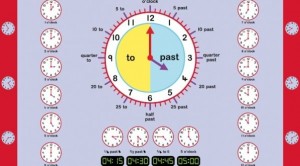Children’s understanding of time generally improves with development and personal experiences of time in everyday life. Time is an abstract concept – something you cannot see or touch – so the best ways to help our children understand time is to relate it to “concrete” events or activities.
These are things the child can relate to through personal experience like lunchtime is when you can eat your lunch and they touch, see, smell, taste it, and hear the bell , or my birthday comes before Christmas, or I can play with my friend after my homework is finished. Children generally understand these basics by preschool or early primary school , but all children, and many kids with ADHD, can get these mixed up at times.
So what are the basics of understanding time?
Children, even in infancy, have a sense of time through sequences of events. While a young child may not be able to verbalise the idea of time, children quickly pick up on the order in which repeated events happen in their everyday lives. They also understand predictable events such as night follows day and day follows night. As children develop, they further refine their understanding of time through:
- understanding what time feels like- what is a second, a minute, an hour in terms of activities in their everyday lives. Sit together and watch a minute or 5 minutes go by.
- understanding what clocks tell us and how to read clocks – analogue then digital

- understanding what terms like “day”, “week”, “month”, “year” etc. mean in terms of personal events like swimming lessons happen once every week or I have one birthday every year.
- knowing the names and sequences of the days of the week, and months of the year.
- Knowing what calendars are, what they tell us, and how they are used
- understanding time concept terms like “before”, “after”, “until”, “next”“then”
- being able to count to 5, 10, 15, 30, 60 (common time frames)
These basics can be useful building blocks in developing your child’s own routines , and if you are already way passed the point where you think they understand all that, it’s worth a detour back to make sure they really do understand the words, skills and concepts related to time that we throw about in their world
Read more: Help your child with ADHD understand and organise time- sequence and order
